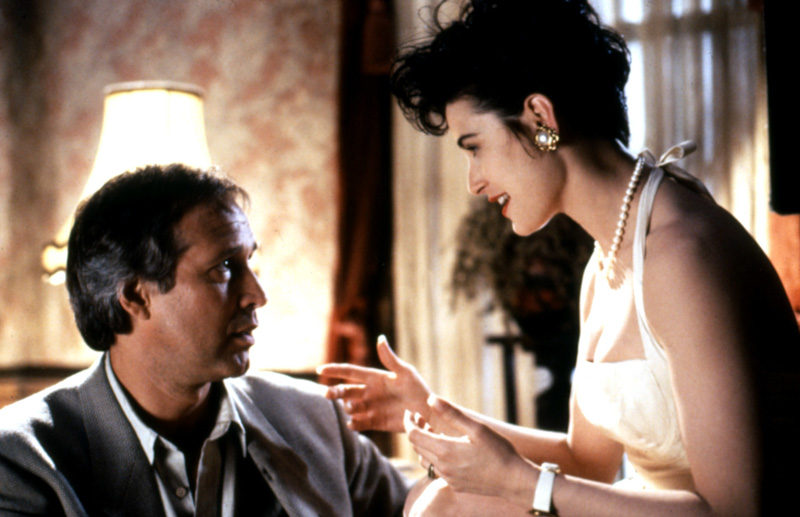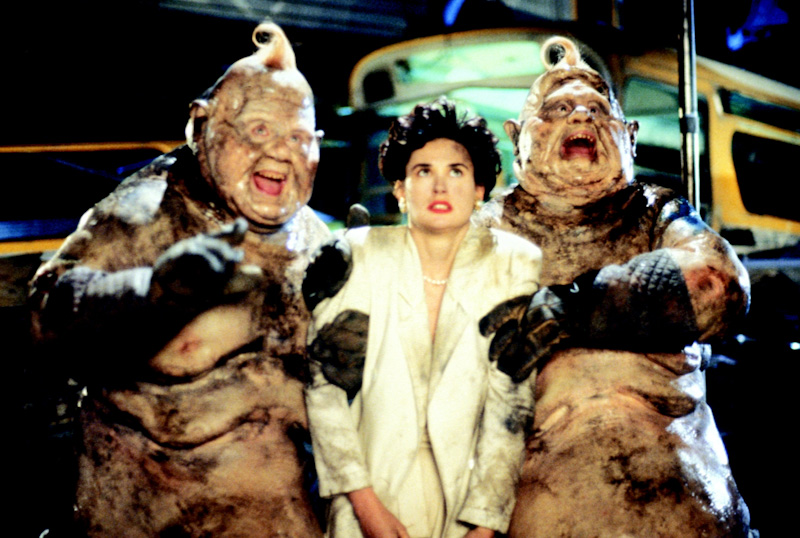Is this a court of record or 'Nothing But Trouble'?

Chevy Chase and Demi Moore star in the 1991 film Nothing But Trouble. Photos from MovieStillsDB.
I’ve always been a fan of those movies that are so bad they’re good. They come in various forms. Sometimes it’s your standard low-budget “B-movie” that owes its appeal to the fact that, despite its low budget, a great deal of effort was put into the production only to yield a subpar result. The 2003 film The Room starring Tommy Wiseau and Juliette Danielle is a great example (and a must-watch for any fan of this genre).
Other films go out of their way to maximize the campiness, almost creating a meta-experience wherein the participants know what they’re trying to accomplish and actively embraces the enterprise. The Sharknado series comes to mind.
Still, those really special treats come out of left field when a movie with a large budget and enough star power to entice audiences falls flat on its face in the collective eyes of critics. Those are the unique ones. Those are the schadenfreude of the silver screen.
‘Nothing But Trouble’
With a career spanning over five decades, Dan Akroyd is more than just a household name; he’s an institution. However, such a prolific career often includes various ebbs and flows. While he’s gained critical acclaim during his professional writing and acting career, not every endeavor has been met with approval.
Enter Nothing But Trouble.
Akroyd wrote the film, and it constituted his directorial debut in 1991. It’s a whimsical amalgam of comedy, horror, science fiction and shock value that most critics negatively received at the time of its release. It was nominated for (and won) multiple Razzie Awards in 1992. IMDb rates the film as a 5.0/10 based on approximately 26,000 votes, while Rotten Tomatoes gives it a 12% on its Tomatometer (based on 25 reviews) with an audience score of only 47% (taken from 10,000+ ratings).
Nevertheless, the film has gained a cult following over the years and seems more well-received as time passes. It’s an eccentric movie for eccentric audiences. If you’re a Dan Aykroyd or Chevy Chase fan and you’ve never seen it, do yourself a favor and check it out. It’s worth a watch. And even if you aren’t a fan of those two, its campy enough to fit into the “so bad its good” category. Akroyd stars as a judge who holds court in his home, and Chase (along with Demi Moore and others) ends up subject to his jurisdiction.
What is a court of record?
As Nothing But Trouble makes exaggeratedly clear, not all courts are created equal.
Now, if we sidestep the absurdity of the film’s “courtroom” scenes, we can see through the embellishment and target a real-life truism: Courts can come in many flavors. I’ve previously discussed the differences between state and federal courts, but there are also differences between state-level courts that may or may not be known to the masses.
When one thinks of a “state court,” they likely imagine a relatively fancy district or county court. However, within these state jurisdictions lie various cities, towns and municipalities that often have their own court systems and locations. Sometimes those courts are actual courthouse; other times, they may be as nondescript as a stand-alone trailer. We have plenty of those in Oklahoma.
These municipal courts come in one of two types. You have your courts of record, and you have your nonrecord courts (courts “not of record”). Surprisingly, the distinction between the two, at least for practical purposes, is pretty simple: A court of record is a court with the ability and responsibility to create and maintain a record of proceedings that can be used for a potential appeal, while a non-record court does not.
Pretty straightforward, right? Well, this discussion is aimed chiefly at state and city/town courts. When dealing with federal courts and other agencies, it’s not always as cut and dried. But that’s a conversation for another column.
Be that as it may, one of the major takeaways is that you can’t directly appeal from a nonrecord court to an appellate court. In every jurisdiction I’m aware of, you must appeal to a court of record from a nonrecord court. So in that sense, you could have a misdemeanor issue initially heard and decided in a nonrecord court. Then once appealed, the matter would have to basically be relitigated in a court of record. Double your fun.
But be careful—just because you find yourself in a court of record doesn’t mean there’s always a record made of the proceedings. Oftentimes, a record will be required only when requested by a judge or one of the parties. As a general rule, always ask for a record if testimony or argument will be given. Also, as I’ve discussed before, do your best to treat the reporters respectfully. They can be invaluable allies.
For anything more specific than that, you’re probably best served by checking the municipal code for the particular locality. Different codes will establish different rules, regulations and jurisdictions for distinct judicial systems and the necessary participants. Though there are various commonalities from court to court, a “one size fits all” approach is never the case.
 Demi Moore in Nothing But Trouble, written and directed by Dan Akroyd.
Demi Moore in Nothing But Trouble, written and directed by Dan Akroyd.
Adapting to the lay of the land
It’s rare that attorneys practicing just any old area of law would find themselves arguing anywhere but a court of record. After all, even though those venues may have the option to exercise jurisdiction over various disputes, anything other than a criminal or quasi-criminal allegation is likely met with a mailed citation and no appearance requirement. Consequently, counsel usually consists of criminal defense attorneys and the municipal prosecutor.
As I mentioned earlier, it’s not unheard of to arrive at a tiny town on a misdemeanor matter, only to realize court is being conducted in a trailer with folding chairs and a card table by a bathroom where you can literally hear the occupant’s business. I’m not kidding. That happened early in my career when I would take any case that could potentially pay the bills. Honestly, though, it was a great experience: The judge and prosecutor generally were both very friendly and welcoming, and the laid-back casual environment led to honest and open negotiations that facilitated a quick and easy resolution that satisfied everyone.
But that isn’t always the case. I’ve also been to some municipal courts where it’s evident the judge and prosecutor rule the roost, and they’re not accustomed to individuals appearing with advocates willing to fight. When you run into this situation in a nonrecord court, some people aren’t necessarily as careful about what they say and how they act.
I distinctly remember taking a small-town DUI early in my practice. When I showed up for the first setting, the prosecutor’s initial offer included jail time. My client had no priors, and there were other extenuating circumstances that mitigated the situation. The prosecutor wasn’t interested in what I had to offer, so I continued the case, thinking he just might be having a bad day. When I showed up for the following date. he was still standoffish and uninterested in finding some sort of middle ground. Knowing I had some factual issues for our benefit, I politely said, “Maybe we should set this for trial and just go with the jury’s decision?”
He laughed and explained, “We don’t do jury trials around here.” Well, if you’re potentially facing jail time in Oklahoma, you’re constitutionally guaranteed a jury if you request one. Luckily, I had brought my pocket recorder and was more than happy to let everyone in that nonrecord court know that we were going on record. After a short in-chambers conference between the judge and prosecutor “regarding court procedure and scheduling,” my client and I walked away contented with the result.
Always plan for the worst-case scenario, and always come prepared. Case dismissed.

Adam Banner
Adam R. Banner is the founder and lead attorney of the Oklahoma Legal Group, a criminal defense law firm in Oklahoma City. His practice focuses solely on state and federal criminal defense. He represents the accused against allegations of sex crimes, violent crimes, drug crimes and white-collar crimes.
The study of law isn’t for everyone, yet its practice and procedure seems to permeate pop culture at an increasing rate. This column is about the intersection of law and pop culture in an attempt to separate the real from the ridiculous.
This column reflects the opinions of the author and not necessarily the views of the ABA Journal—or the American Bar Association.



